Washington’s Commissioner of Public Lands runs the state Department of Natural Resources. The agency is responsible for managing nearly 6 million acres of public lands — everything from coastal waters and aquatic reserves, to working forests, farms, recreation areas and commercial developments.
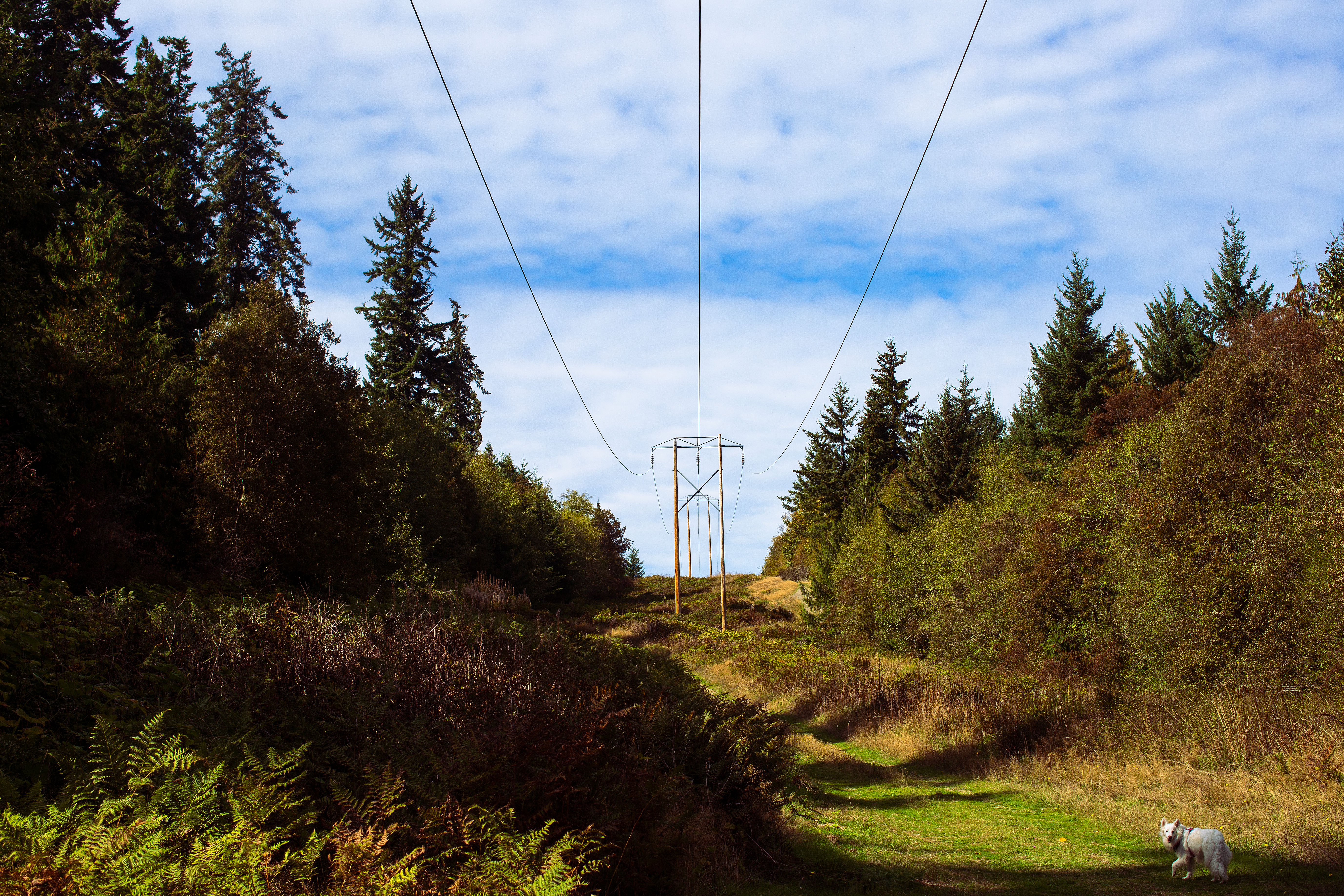
A DNR mature forest remains alongside the Olympic Adventure Trail near the Elwha River in Port Angeles in this undated provided image. The agency spared 69 acres of a timber sale called "Power Plant," after protests from a coalition of groups advocating for preservation of so-called legacy forests. The state will use funds from the natural climate solutions account provided by the state Climate Commitment Act to purchase replacement lands.
Parker Miles Blohm / KNKX Public Radio
Nearly half of those acres are trust lands, that by state mandate must produce revenue to support schools and other services in rural counties, primarily through logging.
A crowded primary in an open race for the position ended in a recount. Democrat Dave Upthegrove squeaked through with 49 votes and is facing off against Republican Jamie Herrera Beutler. He’s the chair of the King County Council; she’s a former congresswoman from Southwest Washington.
Their contest is shaping up to be a clash over forest management styles — and how to best use that resource in the face of climate change.
At stake in this race are three main things: the health of Washington’s timber industry, the next generation of its old growth forests, and how much DNR revenue flows to rural communities.
A legacy industry hanging on
On a Friday morning in Everett, at the height of campaign season, the smell of fresh sawdust filled the air. Herrera Beutler toured the log yard at a more than one-hundred-year-old sawmill, Canyon Lumber. She’s back in politics after voting to impeach Trump — a move that cost her her seat.
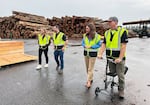
Jamie Herrera Beutler, center, tours Canyon Lumber in Everett on September 27, 2024. She was campaigning in her run for Commissioner of Public Lands. To her right is the company's log buyer, Jake Hambidge.
Bellamy Pailthorp / KNKX Public Radio
The logs here are all Douglas fir and they’re all very big. Canyon Lumber specializes in large timbers for natural wooden interiors in high-end construction.
“Nice looking stuff — like the Portland airport!?” Herrera Beutler exclaims, referencing the new airport terminal made of mass timber from sustainably managed forests.
“Yeah,” said manager Kelly Hambidge, noting that Canyon Lumber works with the same distributor.
But Canyon’s main product line could soon be a thing of the past.
The mill’s log buyer, Jake Hambidge, said the timber they need comes from what is often called “legacy forests.” This is not quite old-growth — that’s off limits in Washington. But, mature trees that are at least 70 years old feed this business, from forests that Herrera Buetler’s opponent wants to set aside and protect from logging.
“A majority of the stuff we cut, it’s just not available on the private sector,” Jake said, noting that large Canadian timbers of this size gets sucked up by a hungry export market. He is left depending on the state agency.
“It comes from the DNR timberland — is where we get all that wood.”

The log yard at Canyon Lumber in Everett on September 27, 2024. The company specializes in large timbers for natural wooden interiors in high-end construction. They rely on DNR for their raw materials.
Bellamy Pailthorp / KNKX Public Radio
The mill’s managers are worried that if Herrera Beutler isn’t elected, they could get forced out of business.
Talking with the employees here, she takes up one of her main campaign points: she wants better management of state forests – and no new set-asides.
“If it’s managed, it can live through fires. If it’s managed, it’s not going to be diseased by beetle or bark. You know, it’s not going to go down. If we remove the ladder fuels and we thin it and make it healthier, the species will do better,” Herrera Beutler said.
“So to say we just put it aside and walk away, to me, is not just endangering that economic piece, which is important, but it’s the environmental piece that’s where I think the win is on this.”
That perspective is not shared by environmental activists, and groups like the Legacy Forest Defense Coalition, who have been working for years to get protection for the state’s mature trees. Their fight is the second big issue in this race: how to manage these so-called ‘legacy’ forests.
One second-growth forest, spared
Near the Elwha River in Port Angeles, along the popular Olympic Adventure Trail, evidence remains of a timber sale that was canceled last year.
“This tree here, which was marked — the red band means that that was the border. So these were slated to be cut down,” said Elizabeth Dunne, as she pointed to rings of red paint on the trunks of several Douglas firs and cedars towering above us.

A ring of red paint on the bark of a mature tree on DNR land denotes the border of a timber sale — a sign that this forest is (or was) slated for cutting. Undated provided image.
Parker Miles Blohm / KNKX Public Radio
Dunne is a local resident and an attorney with the Earth Law Center. They formed a coalition to make the case for saving this forest – because of its role in the recovery of the Elwha River.
“You know, this forest is regenerating. There was some logging that occurred in here. And DNR has done some logging as well,” she said.
It’s not pristine, but it helps protect the Elwha watershed after dam removal. And now it’s protected.
“And what we envision is a full restoration of this forest, because this is our next old growth,” Dunne said.
As a result of her coalition’s work, 69 acres of this forest near the river have been spared by the state using funds from the Climate Commitment Act, to purchase replacement lands for DNR.
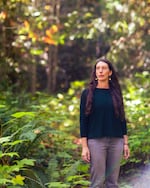
Elizabeth Dunne, a resident of Port Angeles and an attorney with Earth Law Center, co-founded the Elwha Legacy Forest coalition. Dunne supports Upthegrove's campaign for Public Lands Commissioner. Undated provided image.
Parker Miles Blohm / KNKX Public Radio
Tree preservation activists say there are at least another 77,000 acres like this statewide, that should be protected too because of how they absorb and store carbon pollution.
“If we destroy our older forests, then we’re actually accelerating the pace at which climate change will happen, right? And that’s that vicious cycle we don’t want to get into,” she said.
She said there’s only one candidate who has promised to preserve them.
“And Dave Upthegrove came and walked this forest with our community to see what was at stake. And that, to me, meant a lot,” Dunne said.
During a debate with Herrera Beutler in Spokane last month, Upthegrove defended his plan to protect about 80,000 acres of mature legacy forests on ‘day one’ if he wins.
“My proposal is that we make some modest changes to where we harvest, specifically a small group of older forests that bring significant benefit, tremendous benefit, for climate and biodiversity — and instead harvest other forests in those same communities,” Upthegrove said.
Rural communities want more reliable funding
Wherever the harvests ultimately take place, the lands commissioner candidates have to provide logging revenue – or replace it. Junior taxing districts in rural communities statewide depend on it for everything, from school construction to libraries and fire stations.
Case in point: Monroe Ballfield, where a high school girls soccer game was underway on a recent afternoon. It’s a brand-new, all-purpose community sports facility in the center of Port Angeles that was paid for mostly with timber revenue.
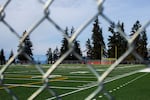
Monroe Field in an undated provided image. The field is a community facility operated by the City of Port Angeles. It was paid for mostly using timber revenue from the Department of Natural Resources.
Parker Miles Blohm / KNKX Public Radio
Clallam County Commissioner Mike French said this field demonstrates the value of working forests in rural communities, where it’s always a struggle to fund public institutions. The logging revenue brings an important boost, he said.
“We don’t have a lot of strong economic growth to be the foundation of all of our public revenue,” he said. “So when we want to do big things, and you know, if you look around our area, there’s not a lot of new public facilities that that look this nice.”
His friend, Port Angeles City Councilmember and Deputy Mayor Navarra Carr, sees it differently. Because, the way things work in this community, timber revenue is so unpredictable that the school district that built the field didn’t budget for it. Instead, they asked voters to approve a levy – so they would have back up funding, just in case.
“I went door to door, knocking for that levy,” Carr said. “And I’m glad that our school district went out for that and our community overwhelmingly supported our schools... we as a community were prepared to pay for this.”
But, with climate change and looming threats to the water supply in Port Angeles that could be made worse with more logging – she said it’s time for the state to find other ways of funding school construction and other amenities in rural communities.
“Who is going to argue that the pool was a bad investment? Not me. Who’s going to argue that our library isn’t a isn’t a good investment? Not me,” Carr said. “And to me it makes me very sad that we have to cut our timber to fund them adequately.“
She said anyone who drives into Port Angeles sees clear cuts along the way, which goes against her values as an environmentalist. She said she’s definitely voting for Dave Upthegrove.
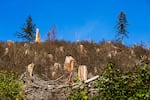
A clear cut outside of Port Angeles, Washington, September 2024.
Parker Miles Blohm / KNKX Public Radio
French, the county commissioner, is still undecided between Upthegrove and Herrera Buetler. He’s a Democrat, but he represents Clallam County’s 3rd District, which includes more conservative communities, like the former mill town of Forks, where the priority is rural jobs.
“And when I go out to the Forks business professionals meeting. That’s what they care about. They care about the revenue, but they care very much about the jobs, because that means the difference between their community thriving or dying,” French said.
So for French, it’s a conundrum: he wants to do right by his constituents in the western part of Clallam County by keeping them employed in timber. But he also agrees that climate change is the most urgent issue of our time, and he wants to elect a public lands commissioner who will take meaningful steps to address it.
This story comes to you from the Northwest News Network, a collaboration between public media organizations in Oregon and Washington.



